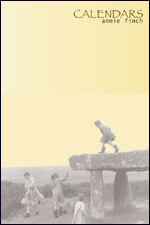 CALYX, A Journal of Art and Literature by Women
CALYX, A Journal of Art and Literature by Women
Winter 2008, vol 24, no. 2
Calendars
Annie Finch
Tupelo Press
P.O. Box 539, Dorset VT 05251
2003, 72 pages, $14.95 paper
Review by Cindy Williams Gutiérrez
Annie Finch’s Calendars is a collection of poems linked by a captivating circling: a circling of time and a circling of sound and thought. Your blood will listen, like a charm. /…/ your blood will listen, every time (“The Menstrual Hut”). This is a contemporary book of hours shining with chants, carols, and elegies that remind us of the mysterious holiness and wholeness of life: and the one and many, whole and part, / touch to blend, to marry in their own time, / to keep all movings’ rhyme— (“A Wedding on Earth”).
In Calendars, Finch is more shaman than formalist. She is keenly aware of the shape and sound of her poems. Whether in a chant, sonnet, ghazal, or even Billy Collins’ contrived paradelle, her skill is effortless: Form is merely the skin that allows her poems to breathe with ease. In “Ghazal for a Poetess,” Finch deftly uses the radif to return to one of the book’s recurring themes—the emergence of growth from the dark:
Your black lines weave a trousseau from
their darker edges.
Your nights spread quiet over “parched and
dreary” sand
Finches fill them till they glow from their
darker edges.
Reclaiming the oral power of poetry, Finch widely explores the use of repetition in this collection—repeating sound, word, phrase, and line in a myriad of combinations. In “Imbolc Chant,” she repeats a refrain as an invitation to linger with her for the return of the sun: Wait with me. See, she comes circling. Then in “Final Autumn,” she ends each stanza with the word she precisely implies in “Imbolc Chant”—each stanza shimmers with the final sun of the poem’s addressee. Finch wields her magic of music and mantra to mystically enchant: a darker wing of flower / point you like a fire. / Point your fire like a flower (“Summer Solstice Chant”).
It is clear that a strong intellect informs these poems. Perfection’s habit, opens us to find / cuts in a window we have never loved— (“The Intellect of Woman”). But their substance—their deeper sense of knowing—flows from the body, the human body and the earth’s. In “A Wedding on Earth,” oceans, deserts, rivers, and forests move / with the tumbled bodies, sounding hearts, surfacing eyes and searching wings of love—. In Finch’s poems, the bodies of human and earth gravitate toward the place where they are sublimely inextricable: The church is in me, the church of the tall tree (“Churching”).
Calendars is a collection that illuminates over time. There is endless music of sound and sense: till we turn and are empty, / till we turn and are full (“Over Dark Arches”). There are images worth savoring: rocky pools cupping the salt of the human (“A Carol for Carolyn”). And there are riddles to unravel: Now I watch the watching dark my light’s long-growing dark makes known (“A Seed for Spring Equinox”). It is meant to be read again and again. Read it outdoors. Read it aloud. Read it and dance. Or read it and chant. Just read it with your body’s memory (“Lamia to Lycius”).

